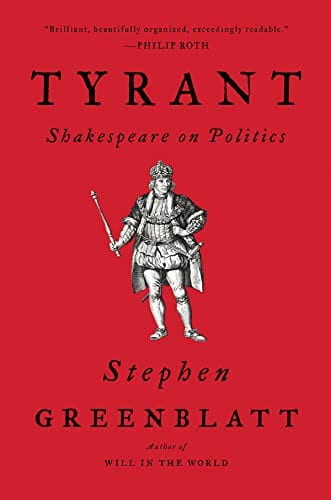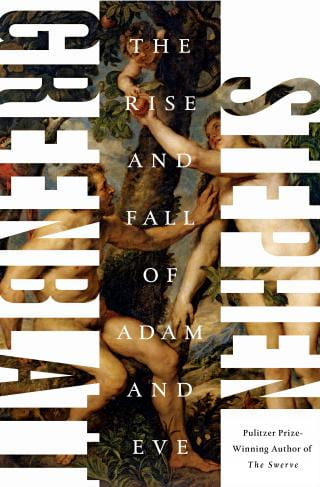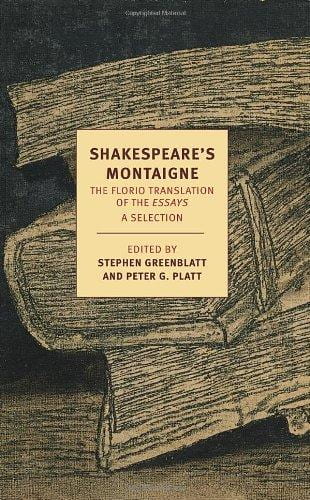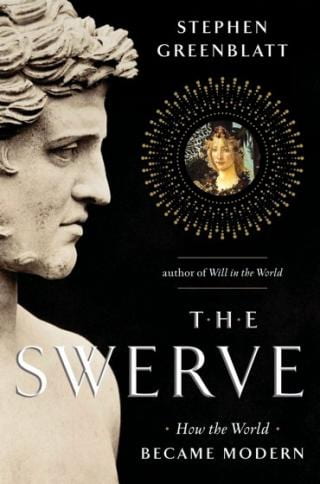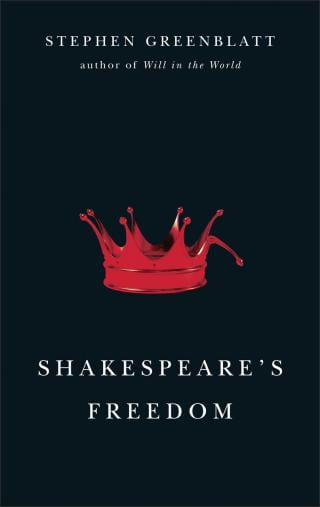Books










Books
Die Erfindung der Intoleranz: Wie die Christen von Verfolgten zu Verfolgern wurden. Göttingen: Wallstein Verlag, 2019.
Tyrant: Shakespeare on Politics. New York: W. W. Norton, 2018; Chinese, Italian, German, and Spanish translations.
The Rise and Fall of Adam and Eve. New York: W.W. Norton, 2017; Chinese, French, German, Italian, Korean, Portuguese, and Spanish translations.
Afterword Callaghan, Dympna and Gossett, Suzanne, eds. Shakespeare in Our Time: A Shakespeare Association of America Collection. New York: Bloomsbury, 2016.
Introduction Simpson, James. Reynard the Fox: A New Translation. New York: Liveright-Norton, 2015.
Foreword Sendak, Maurice. My Brother’s Book. New York: HarperCollins, 2013.
The Swerve: How the World Became Modern. New York and London: W.W. Norton, 2011; Chinese, Dutch, French, German, Greek, Hungarian, Italian, Japanese, Korean, Polish, Portuguese, Romanian, Russian, Spanish, and Turkish translations.
Shakespeare’s Freedom. Chicago: University of Chicago Press, 2010; Chinese and Japanese translations.
Cultural Mobility: A Manifesto, with Ines Zupanov, Reinhard Meyer-Kalkus, Heike Paul, Pal Nyiri, and Friederike Pannewick. Cambridge: Cambridge University Press, 2010.
Freiheit, Schönheit und die Grenzen des Hasses Suhrkamp. Translated by Robin Cackett and Klaus Binder. Frankfurt: Surkamp Verlig, 2007. [German]
Poetyka kulturowa: Pisma Wybrane. Translated by Krystyna Kujawińska-Courtney. Krakow: Universitas Press, 2006. [Polish]
Will in the World: How Shakespeare Became Shakespeare. New York and London: W.W. Norton, 2004, reissue with new afterword, 2016; Chinese, Croatian, Czech, Dutch, Finnish, French, German, Hebrew, Italian, Japanese, Korean, Lithuanian, Polish, Portuguese, Serbian, Slovenian, Spanish, and Turkish translations.
The Greenblatt Reader, with Michael Payne, Editor, hardback and paperback editions; London, Malden, MA and Carlton, Australia: Blackwell Publishing, 2005.
Hamlet in Purgatory. Princeton: Princeton University Press, 2001; Italian (Rome: Carocci Editore, S.P.A., 2002), and German translations.
Was ist Literaturgeschichte? trans. Reinhard Kaiser and Barbara Naumann, (Frankfurt: Suhrkamp, 2000)
Practicing New Historicism [with Catherine Gallagher]. Chicago: University of Chicago Press, 2000; Croatian, German, Italian, Polish, Portuguese, and Spanish translations.
New Historicism: Literaturgeschichte als Poetik der Kultur, ed. Moritz Bassler; Frankfurt: Fischer, 1995.
Marvelous Possessions: The Wonder of the New World. Oxford: Clarendon Press, 1991; Chicago: University of Chicago Press, 1991; Czech, German, Italian, Japanese, Portuguese, and Spanish translations.
Learning to Curse: Essays in Early Modern Culture. New York and London: Routledge, 1990; German and Japanese translations. (Second edition: New York: Routledge, 2006)
Shakespearean Negotiations: The Circulation of Social Energy in Renaissance England. Berkeley: University of California Press, 1988; Oxford: Clarendon, 1988; German and Turkish translations.
Renaissance Self-Fashioning: From More to Shakespeare. Chicago: University of Chicago Press, 1980; Greek translation.
Sir Walter Ralegh: The Renaissance Man and His Roles. New Haven: Yale University Press, 1973.
Three Modern Satirists: Waugh, Orwell, and Huxley. New Haven: Yale University Press, 1965.
Volumes edited (with introductions):
Editor, Shakespeare’s Montaigne: The Florio Translation of the Essays, A Selection. (New York: New York Review Books Classics, 2014).
General Editor, The Norton Anthology of English Literature.New York: W.W. Norton. 9th edition. 2 vols. 2012.
Co-Editor, Religio Medici and Urne-Buriall by Sir Thomas Browne, (New York: New York Review Books Classics, 2012).
General Editor, The Norton Shakespeare (New York: Norton, 2015, 2008, 1997).
General Editor, The Norton Anthology of English Literature.New York: W.W. Norton. 8th edition. 2 vols. 2006.
Associate General Editor, The Norton Anthology of English Literature, 7th edition, 2 vols. (New York: Norton, 1999)
Co-Editor, “The Sixteenth Century,” in The Norton Anthology of English Literature, 7th edition.
New World Encounters (Berkeley and London: University of California Press, 1993)
Redrawing the Boundaries: The Transformation of English and American Literary Studies, with Giles Gunn (New York: MLA, 1992). Korean translation.
Essays in Memory of Joel Fineman (special issue of Representations, 1989)
Representing the English Renaissance (Berkeley and London: University of California Press, 1988)
The Power of Forms in the English Renaissance (Norman, Oklahoma: Pilgrim Books, 1982)
Also published as: The Forms of Power and the Power of Forms, a double issue of Genre, 1982
Allegory and Representation, Selected Papers from the English Institute, 1978-1980 (Baltimore: The Johns Hopkins University Press, 1981; paperback edition, 1986) Japanese translation
General Editor, “The New Historicism: Studies in Cultural Poetics” (series of volumes published by University of California Press)
Articles
“Competitive Consumption,” The New York Review (New York: December 22, 2022).
“Survival Strategies: Shakespeare and Renaissance Truth-Telling,” Cahiers Élisabéthains 108 (Newbury Park: May, 15, 2022).
“’To Be or Not to Be’: Is It the Question or the Point?”. NY Times (New York: May 6, 2022).
“A Symposium on Anxiety,” The Threepenny Review 163 (Berkeley: Fall 2020).
“Witness to a Mystery,” New York Review of Books (New York: June 11, 2020).
“What Shakespeare Actually Wrote About the Plague,” The New Yorker (New York: May 7, 2020).
“Invisible Bullets: What Lucretius Taught Us About Pandemics,” The New Yorker (New York: March 16, 2020).
“The Strange Terror of Watching the Coronavirus Take Rome,” The New Yorker (New York: March 4, 2020).
“A Symposium on Deserts,” The Threepenny Review 157 (Berkeley: Spring 2019).
“Elon Musk wants to put chips in our brains. I’d prefer to stay human,” The Guardian (New York: December 23, 2018).
“Shakespeare’s Close Call with Tyranny,” The New Yorker (New York: May 4, 2018).
“Why Our Stories Matter,” The New York Times (New York: December 21, 2017).
“The Day After,” The Paris Review (Paris: September 15, 2017).
“Sex in the Garden,” The Paris Review (Paris: September 14, 2017).
“The Tree of Knowledge, Good, and Evil,” The Paris Review (Paris: September 13, 2017).
“Eating the Fruit,” The Paris Review (Paris: September 12, 2017).
“What Chimpanzees Can Teach Us About Adam and Eve,” The New Yorker (New York: September 5, 2017).
“If You Prick Us,” The New Yorker (New York: July 10, 2017).
“How St. Augustine Invented Sex,” The New Yorker (New York: June 19, 2017).
“The Trump Family Shouldn’t Fight Shakespeare. They’ll Lose.” The Washington Post (Washington: June 13, 2017).
“On Historical Fiction,” The Threepenny Review 149 (Berkeley: Spring 2017).
“Augustinus Im Badehaus: Die Transgression Als Lebensgeschichte Und Dogma” Konversionen Erzählungen der Umkehr und des Wandels (Mosse-Lectures an der Humboldt-Universität zu Berlin: Vorwerk 8 2017).
“Wie kommt ein Soziopath zue Macht?” Glanzlichter der Wissenschaft – Ein Almanach (Heidelber: Winter 2016).
“Carta de Shakespeare a Cervantes,” Cervantes Shakespeare 1616-2016. Edited by José Manuel Gongález (Reichenberger: 2017).
“Shakespeare to Cervantes,” Belgrade Literary Magazine. ed. Milovan Marčetić, Serbian translation. (Belgrade: 2016).
“Age is Unnecessary: Shakespeare and Life History” Finkfest: Letteratura, cinema e altry mondi: Guido Fink nei luoghi del sapere (Aras Edizioni: 2016).
“Shakespeare Explains the 2016 Election,” The New York Times (New York: October 8, 2016).
“How Shakespeare Lives Now,” New York Review of Books (New York: April 21, 2016); Lettre Internationale (Romanian translation, Autumn 2016).
“The Traces of Shakespeare’s Life,” Memoria di Shakespeare; A Journal of Shakespearean Studies, eds. Rosy Colombo and Gary Taylor (Rome: December 2015).
“Teaching a Different Shakespeare From the One I Love,” New York Times Magazine (New York: September 13, 2015).
“Shakespeare in Tehran,” New York Review of Books (New York: April 2, 2015).
“The Naughty Pleasures of Boccaccio,” New York Review of Books (New York: January 8, 2015).
“Wondrous, Fragile, Tedious Berkeley,” New York Review of Books (New York: February 6, 2014).
“On the Edge of Slander,” New York Review of Books (New York: September 26, 2013).
“Glories of Classicism,” New York Review of Books (New York: February 21, 2013).
“Call of the Wild,” The New York Times (New York: February 8, 2013).
“The Shape of a Life,” The New Yorker (New York: February 5, 2013).
“Donna Brookman: Aorist and Fullflood.” Fullflood, by Donna Brookman. (Los Angeles: Gray Heron Press, 2013).
“A Man of Principle,” New York Review of Books (New York: March 8, 2012).
“The Answer Man,” The New Yorker (New York: August 8, 2011).
“The Lonely Gods,” New York Review of Books (New York: June 23, 2011).
“Shakespeare and the Will to Deceive,” The New York Times (New York: April 28, 2011).
“Shakespeare and Shylock,” New York Review of Books (New York: September 30, 2010).
“Shakespeare in No Man’s Land,” New York Review of Books (New York: December 17, 2009).
“How It Must Have Been,” New York Review of Books (New York: November 5, 2009).
“A Great Dane Goes to The Dogs,” New York Review of Books (New York: March 26, 2009).
“On Real Presence,” Book of Iterations, ed. Pippa Skotness. (Cape Town: Axeage, 2009), pp. 58-75.
“In the Night Kitchen,” New York Review of Books (New York: 55:12, July 17, 2008), 28-30.
“Stroking,” New York Review of Books (New York: November 8, 2007).
“Prema Poetici Kulture,” Poetika renesansne kulture: novi historizam, ed. David Sporer, translated by Maja Tancik. (Zagreb: Disput, 2007), 79-94.
“In Praise of Focused Intensity,” Producing Presences: Branching Out From Gumbrecht’s Work, ed. Victor K. Mendes and Joao Cezar de Castro Rocha. (Dartmouth, Massachusetts: University of Massachusetts Dartmouth, 2007), 41-46.
“Utopian Desire,” After History, ed. Martin Prozchaka. (Czech Republic: Charles University, 2007), 54-62.
“Murdering Peasants,” Class, Boundary and Social Discourse in the Renaissance ed. Alexander C.Y. Huang, I-chun Wang and Mary Theis. (Taiwan: National Sun Yat-Sen University, 2007).
“Writing as Performance,” Harvard Magazine (September-October 2007: 110/1).
“Shakespeare and the Uses of Power,” New York Review of Books (New York: 54:6, April 12, 2007).
“Stadt des Gedächtnisses,” Die Tageszeitung (17 August 2006: 13).
“Symposium on the Family,” The Threepenny Review.(Berkeley: Summer 2006: 9).
“Who Killed Christopher Marlowe?” New York Review of Books (New York: 53:6, April 6, 2006)
The Imaginary Life of Ordinary Things: the dish ran away with the spoon [with David Schorr]. Middletown, Conn: Davison Art Gallery, Wesleyan University, 2006.
“Words that Shrink Distances between Cultures,” Sunday Los Angeles Times op-ed piece (Los Angeles: April 17, 2005).
“The Death of Hamlet and the Making of Hamlet,” New York Review of Books (New York: 51:16, October 21, 2004).
“Friends, Americans, Countrymen…,” New York Times Op-ed piece (New York: October 3, 2004).
“Shakespeare’s Leap,” The New York Times (New York: September 12, 2004).
“Governance-Forschung: Politik und Macht bei Shakespeare,” in Engagement fuer Kultur und Gesellschaft (Deutsche Bank Bulletin 2004/2), pp. 2-3.
“A Symposium on the Dead,” Adam Phillips et al, Threepenny Review, 96, (Berkeley: Winter 2004 29-30).
Essay, commentaries in Diaspora: Homelands in Exil , Brenner, Frederic (New York: Harper Collins, 2003), Vol. 2 Voices, pp. 2, 8, 40, 53, 64, 76, 77, 102.
“In Memoriam: Yasunari Takahashi,” Poetica 59: 125-139, (Tokyo: Fall 2003) pp.37-39.
“Open Forum: Scholarly Publishing and the Tenure Process,” S. Greenblatt, J. Engell et al, Literary Imagination 5:1 (Winter 2003), 151-164.
“Presidential Forum: Literary Engagement – Introduction,” MLA Profession (2003) 7-8.
“Presidential Address 2002: ‘Stay, Illusion’ – On Receiving Messages from the Dead,” PMLA, 118 (2003), pp. 417-26.
“Scholarly Publishing and the Dream of the Imperial Message,” reprint of speech delivered at 125th Anniversary of the Johns Hopkins University Press: Johns Hopkins University Press (Summer 2003).
“Ghosts,” (excerpt from MLA Presidential Address, December 2002), The American Scholar, 72:2 (Spring 2003), p. 160.
“A Eulogy,” Michigan Quarterly Review (Fall 2002), pp 543-545.
“Keep Us Informed,” President’s Column in MLA Newsletter, 34:4 (Winter 2002), p. 3.
“The MLA in the World,” President’s Column in MLA Newsletter, 34:3 (Fall 2002), pp. 3-4.
“E-Mail Academy,” President’s Column in MLA Newsletter , 34:2 (Summer 2002), p.3.
“Scholars at Risk,” President’s Column in MLA Newsletter 34:1 (2002), pp. 3-4.
“Racial Memory and Literary History,” PMLA 116 (2001) 48-63.
“Commentary I,” in Word and Image 17 (2001), pp. 62-64.
“Ghosts of Berlin,” OpEd essay, The New York Times (New York: May, 28 1999).
“The Tempest: Martial Law in the Land of Cockaigne,” Shakespeare: The Last Plays, ed. Kiernan Ryan (London: Longman, 1999), 206-244. [reprint]
“Hamlet im Fegefeuer,” in Rituale heute: Theorien-Kontroversen-Entwürfe, ed. Corina Caduff and Joanna Pfaff-Czarnecka (Berlin: Reimer, 1999), pp. 99-125.
“About That Romantic Sonnet…” OpEd essay, New York Times (New York: February 6, 99) German trans. Tages-Anzeiger; Theaterheute.
“America’s Raciest Read,” Op-Ed essay, New York Times (New York: September 22, 1998) on Starr report.
“Auerbach and New Historicism,” in Kyoto English Review Vol. 2 No. 2 (1998), pp. 1-20.
“The Use of Salutary Anxiety in The Tempest,” in Shakespeare, The Tempest, ed. Robert Langbaum (New York: Signet, 1998), pp. 156-79. (adapted from Shakespearen Negotiations).
“The Touch of the Real,” in Representations 59 (1997) (Special Issue: “The Fate of ‘Culture’: Geertz and Beyond”), 14-29.
“The Mousetrap: In Memory of Louis Marin,” Shakespeare Studies (Japan) 35 (1997), 1-32. “Past Na Mysi,” Czech translation in Svêt Literatury 17 (1999) pp. 3-23.
Foreword, A New History of Early English Drama, ed. John D. Cox and David Scott Kastan (New York: Columbia University Press, 1997).
“What Is the History of Literature? Critical Inquiry 23 (1997), pp. 460-81. A version also appears as “Benefit of Clergy, Benefit of Literature,” in Stanford Humanities Review 6 (1998), pp. 11-25. Translation: “Ó que é a historia da literatura?” in Interseções: Revista de Estudos Interdisciplinares (Rio de Janeiro) 1:1 (1999), pp. 13-32; and “¿Que es la historia literaria” in Teorias de la historia literaria, Luis Beltran Almeria and Jose Antonio Escrig, eds (Madrid: Arco/Libros Bibliotheca Philologica, 2005), pp. 91-122.
“Hamlet: Interiority and Revenge,” in “Hamlet” ou le texte en question, eds. Gilles Mathis and Pierre Sahel (Paris: Editions Messene, 1997), pp. 9-19.
“Il Nuovo Storicismo e il Futuro della Letteratura,” in Allegoria: Per uno Studio Materialistico della Letteratura 8 (1996), pp. 130-143.
“Warum reisen?” in Voyage: Jahrbuch für Reise- & Tourismusforschung 1997 (Köln: DuMont, 1997), pp. 13-17.
“Bildung als Uberlebensmittel,” in Berliner Zeitung, Einstein Forum Supplement (December 3, 1997), pp. VI-VII.
“Vom höchst Begabten bis zu dem, der eben lesen mag,” Frankfurther Allgemeine Zeitung (November 14, 1997), p. 48.
“The Interart Moment,” in Interart Poetics: Essays on the Interrelations of the Arts and Media, ed. Ulla-Britta Lagerroth, Hans Lund, and Erik Hedling (Amsterdam: Rodopi, 1997), pp. 13-15.
“Miracles,” in The Threepenny Review 69 (Berkeley: 1997), p. 34.
“Die Macht des Als-ob,” in NZZ Folio (Dec. 1996), pp. 28-29.
“Mutilation and Meaning,” in Miscast: Negotiating the Presence of the Bushmen, ed. Pippa Skotnes (Cape Town: University of Cape Town Press, 1996), pp. 25-39. [Hungarian translation in Cafe Babel (Budapest)].
“William Shakespeare drammaturgo elisabettiano,” in Storio della Civilita Letteraria Inglese, ed. Franco Marenco, 4 vols. (Torino: UTET, 1996), 1:551- 75.
“Best Books of 1995,” in Misuzu (Tokyo) 418 (1996), pp. 42-43.
“Warum reisen?” in NZZ Folio 6 (June, 1996), pp. 7-11. Also in Voyage: Jahrbuch fur Reise- & Tourismusforschung (Koln: DuMont, 1997), pp. 13-17.
“Changelings: Mozart, Shakespeare, and the Art of Maurice Sendak,” in Townsend Center Occasional Papers #5 (1996), pp. 25-33. A shorter version appeared as “Maurice Sendak’s Rabbis,” in The Threepenny Review 66 (Berkeley: 1996), pp. 32-33.
“Remnants of the Sacred in Early Modern England,” in Subject and Object in Renaissance Culture, ed. Margreta de Grazia, Maureen Quilligan, and Peter Stallybrass (Cambridge: Cambridge University Press, 1996), pp. 337-45.
“What light through yonder Windows breaks?” (review of CD-ROM Romeo and Juliet and Macbeth), in Civilization 3 (1996), pp. 78-79.
“Martial Law in the Land of Cockaigne,” in Materialist Shakespeare, ed. Ivo Kamps (London: Verso, 1995), 108-41.
“Memory and Monumentality,” The Threepenny Review 64 (Berkeley: 1996), pp. 35-36. See also “Grounds for Remembering,” in Grounds for Remembering: Monuments, Memorials, Texts (Townsend Center for the Humanities Occasional Papers, 1995), pp. 22-28.
“Columbus Runs Aground: Christmas Eve, 1492,” in The Sheila Carmel Lectures, 1988-1993, ed. Hana Wirth-Nesher (Tel Aviv: Tel Aviv University, 1995), pp. 125-47; Counting and Recounting: Measuring Inner and Outer Space in the Renaissance, ed. Paola Bottalla and Michela Calderaro (Trieste: Edizioni La Mongolfiera, 1995), pp. 13-40.
“The Interart Moment” (“Mote mellan konstarterna bar frukt”) in Svenska Dagbladet (Stockholm), May 15, 1995.
“A Mark Morris Symposium,” (on L’Allegro, il Penseroso, ed il Moderato) in The Threepenny Review 61 (Berkeley: 1995), pp. 20-21.
“The Eating of the Soul,” in Representations 48 (1994), pp. 97-116 (earlier version in Intrecci e Contaminazioni, ed. Valerio de Scarpis, Loretta Innocenti, Franco Marucci, and Armando Pajalich [Venice: Supernova, 1993], pp. 65-820.
“Toward a Universal Language of Motion: Reflections on a Seventeenth-Century Muscle Man,” in Linq 21 (1994), pp. 56-62; also in Choreographing History, ed. Susan Leigh Foster (Bloomington: Indiana University Press, 1995), pp. 25-31.
“Books I Read in 1993,” in Misuzu (Tokyo) Vol. 36 No. 1 (1994), pp. 64.
“Utopian Desire,” in Surprised by Scenes, ed. Yasunari Takada (Tokyo: Kenkysha, 1994), pp. 1-15.
“Shakespeare Bewitched,” in New Historical Literary Study: Essays on Reproducing Texts, Representing History, ed. Jeffrey N. Cox and Larry J. Reynolds (Princeton: Princeton University Press, 1993), 108-135; Shakespeare and Cultural Traditions, ed. Tetsui Kishi, Roger Pringle, and Stanley Wells (Newark, Delaware: University of Delaware Press, 1994), pp. 17-42.
“La souris mangeuse d’hostie: les miettes du repas eucharistique,” in Traverses 5 (1993), pp. 42-54.
“The Emotion of Multitude” (“Pocit Nesmirneho Mnozstvi”) in Svet Literatury (Prague) (1992), pp. 78-84.
“The MLA on Trial,” in Profession (1992), pp. 39-41.
“Utopian Desire,” in Litteraria Pragensia 4 (1992), 30-41.
“Laos Is Open,” Threepenny Review 51 (Berkeley: 1992), 20-23; reprinted in H. Aram Veeser, ed., Confessions of the Critics (New York: Routledge, 1996), pp. 221-34.
“‘A passing marvellous thing. . .’: Global Visions in the Age of Columbus,” Times Literary Supplement (January 3, 1992), 14-15.
“Varieties of Historicism” and “The Silence of the Criminal,” in Litteraria Pragensia: Studies in Literature and Culture 1 (1991), 3-4, 57-60. (Czech translation in Iricialy 2 [May-June 1991], pp. 31-34.)
“The Best Way to Kill Our Literary Inheritance. . .” in The Chronicle of Higher Education 37 (June 12, 1991), pp. B1-B3. Reprinted in The Council Chronicle (November, 1991), p. 16.
“The Demand for Love,” Program essay for the American Repertory Theatre production of King Lear (Spring, 1991)
“Joel Fineman’s ‘Will’,” in Joel Fineman, The Subjectivity Effect in Western Literary Tradition (Cambridge, Mass.: MIT Press, 1991), pp. ix-xix.
“Where Little Fyodor Played,” in London Review of Books 13 (1991), pp. 8-10.
“Story-Telling,” in The Threepenny Review 11 (Berkeley: 1990), p. 23.
“Elizabeth I,” Encyclopaedia Britannica 15th edition (1990), 18: 243-47.
“Resonance and Wonder,” in Bulletin of the American Academy of Arts and Sciences 43 (1990), pp. 11-34. Also in Literary Theory Today, ed. Peter Collier and Helga Geyer-Ryan (Cambridge: Polity Press, 1990), pp. 74-90; Exhibiting Cultures: The Poetics and Politics of Museum Display, ed. Ivan Karp and Steven D. Lavine (Washington and London: Smithsonian Institution Press, 1991), pp. 42-56;
German translation, “Resonanz und Staunen,” in Freibeuter 47 (1991), pp. 14-30; Portuguese translation, “O novo historicismo,” in Estudos Hisoricos 8 (1991), pp. 244-61.
“Culture,” in Critical Terms for Literary Study, ed. Thomas McLaughlin and Frank Lentricchia (Chicago and London: University of Chicago Press: 1990), pp. 225-32.
“Identity” entry in The Spenser Encyclopedia.
“In Memory of Joel Fineman,” Representations 28 (1989), pp. 1-3.
“Anti-Dictator” (on Etienne de la Boetie), in The Harvard History of French Literature, ed. Denis Hollier (Cambridge: Harvard University Press, 1989), pp. 223-28.
“The King Retires,” Program essay for Old Vic production of King Lear (director: Jonathan Miller), Spring, 1989.
“Maravilhosas possessoes,” in Estudos Historicos (Sao Paulo, Brazil) 3 (1989), pp. 43-62.
“Where Do We Go From Here?” in The Village Voice Literary Supplement (October, 1988), p. 21.
“The Manipulation of Anxiety,” in Shakespeare-Jahrbuch (Berlin, 1988), pp.163-69.
“Erotische Provokation im Elisabethanischen Theater,” in Shakespeare-Jahrbuch (Berlin, 1988), pp. 56-61.
“Towards a Poetics of Culture,” in Southern Review 20 (1987), pp. 3-15. (Japanese translation, in iichiko 16 [1990], pp. 111-26). A slightly different version of this essay appears as “Capitalist Culture and the Circulatory System,” in The Aims of Representation: Subject/Text/History, ed. Murray Krieger (New York: Columbia University Press, 1987), pp. 257-73. Norwegian translation: “Mot en Kulturens Poetikk,” in Samtiden (Oslo) 6 (1994), pp. 53-62.
“Psychoanalysis and Renaissance Culture,” in Literary Theory/Renaissance Texts, ed. Patricia Parker and David Quint (Baltimore and London: Johns Hopkins University Press, 1986), pp. 210-224. also in
The Renaissance: Italy and Abroad, ed. John Jeffries Martin (London: Routledge, 2003), pp. 124-38.
“Fiction and Friction,” in Reconstructing Individualism: Autonomy, Individuality, and the Self in Western Thought, ed. David Wellberry and Thomas Heller (Stanford: Stanford University Press, 1986), pp. 30-52.
“Loudun and London,” in Critical Inquiry 12 (1986) pp. 326-46.
“Exorcism into Art,” in Representations 12 (1985), pp. 15-23.
“Shakespeare and the Exorcists,” in Shakespeare and the Question of Theory, eds. Patricia Parker and Geoffrey Hartman (London: Methuen, 1985), pp. 163-87. Reprinted in William Shakespeare’s ‘King Lear’, ed. Harold Bloom (New York: Chelsea House, 1987), pp. 97-119; in Contemporary Literary Criticism: Literary and Cultural Studies, 2nd ed., ed. Robert Con Davis and Ronald Schleifer (New York and London: Longman, 1989), pp. 428-47; and in Shakespeare: King Lear, ed. Frank Kermode (London: Macmillan, 1992), pp. 258-98. A slightly different version of this essay appears in After Strange Texts: The Role of Theory in the Study of Literature, ed. Gregory S. Jay and David L. Miller, Papers from the University of Alabama’s Ninth Annual Symposium in English and American Literature, 1982 (University, Alabama: University of Alabama Press, 1985), pp. 101-23.
“China: Visiting Rites (II),” in Raritan 4 (1985), pp. 44-56. Reprinted in Cambridge Review 108 (1987), pp. 154-58.
“Murdering Peasants: Status, Genre, and the Representation of Rebellion,” in Representations 1 (1983), pp. 1-29
“Chinese English,” in The Threepenny Review 12 (Berkeley: 1983), pp. 4-7; reprinted as “China: Visiting Rites,” in Raritan 2 (1983), pp. 1-23
“King Lear and Harsnett’s “Devil-Fiction,” in The Power of Forms in the English Renaissance, ed. Stephen Greenblatt (Norman, Oklahoma: Pilgrim Books, 1982), pp. 239-42
“Filthy Rites,” in Daedalus lll (1982), pp. 1-l6 (a brief early version appeared in University Publishing 8 [1979], pp. 5-6
“The Cultivation of Anxiety: King Lear and His Heirs,” Raritan 2 (1982), pp. 92-124. Reprinted in K. M. Newton, Theory Into Practice: A Reader in Modern Literary Criticism (London: Macmillan, 1992), pp. 256-74; “King Lear”: Contemporary Critical Essays, ed. Kiernan Ryan (London: Macmillan, 1993), pp. 158-79
“Invisible Bullets: Renaissance Authority and Its Subversion,” in Glyph 8 (1981), p. 40-61. Revised versions of this essay appear in Political Shakespeare: New Essays in Cultural Materialism, ed. Jonathan Dollimore and Alan Sinfield (Manchester: Manchester University Press, 1985), pp. 18-47 (reprinted in William Shakespeare’s ‘Henry IV, Part 2’‘, ed. Harold Bloom (New York: Chelsea House, 1987), pp. 125-50); Shakespeare’s ‘Rough Magic’: Renaissance Essays in Honor of C. L. Barber, ed. Peter Erickson and Coppelia Kahn (Newark, Delaware: University of Delaware Press, 1985), pp. 276-302; and Shakespeare: An Anthology of Criticism and Theory 1945–2000, R. McDonald, ed., (March 2003, Blackwell Press: Oxford)
“The Resonance of Renaissance Poetry,” in ADE Bulletin 64 (1980), pp. 7-10
“Improvisation and Power,” in Literature and Society, ed. Edward Said (Baltimore: The Johns Hopkins University Press, 1980), pp. 57-99 (reprinted in William Shakespeare’s ‘Othello’, ed. Harold Bloom [New York, Chelsea House, 1987] and in Shakespearean Tragedy, ed. John Drakakis [London and New York: Longman, 1992], 153-93). (A brief, early version appeared as “The Improvisation of Power: The Power of Improvisation,” in University Publishing 7 [1979], pp. 17-18)
“Marlowe, Marx, and Anti-Semitism,” in Critical Inquiry 5 (1978), pp. 291-307. German trans. in Christopher Marlowe, Der Jude von Malta, trans. Erich Fried (Berlin: Wagenbach, 1991), pp. 125-52.
“More, Role-Playing, and Utopia,” in The Yale Review 67 (1978), pp. 515-536
“More and the Suburb,” in University Publishing 5 (1977), pp. 16-17
“Marlowe and Renaissance Self-Fashioning,” in Two Renaissance Mythmakers: Christopher Marlowe and Ben Jonson, ed. Alvin B. Kernan (Baltimore: The Johns Hopkins University Press, 1977), pp. 41-69
“The False Ending in Volpone,” in Journal of English and Germanic Philology 75 (1976), pp. 90-104
“Learning to Curse: Aspects of Linguistic Colonialism in the Sixteenth Century,” in First Images of America: The Impact of the New World on the Old, ed. Fredi Chiappelli (Berkeley: University of California Press, 1976), pp. 561-580
“Sidney’s Arcadia and the Mixed Mode,” in Studies in Philology 70 (1973), pp. 269-278
Reviews and Interviews
Review of Roberto Calasso (trans. Tim Parks), The Book of All Books, “Before He Died, the Writer Roberto Calasso Had the Old Testament on His Mind,” in The New York Times (New York: January 18, 2022)
Review of Scott G. Bruce, The Penguin Book of Hell, “Damn It All,” in New York Review of Books (New York: December 20, 2018)
Review of Peter Lake, How Shakespeare Put Politics on the Stage: Power and Succession in the History Plays, in Common Knowledge, Volume 24, Issue 3 (August 2018)
Review of Dominic Dromgoole, Hamlet Globe to Globe, “Their Hours Upon the Stage: Performing ‘Hamlet’ Around the World,” in New York Times Book Review (New York: April 21, 2017)
Review of David Grossman, A Horse Walks into a Bar, “The King of the Bitter Laugh,” New York Review of Books (New York: April 20, 2017)
Review of Sir Brian Vickers, The One King Lear, “Can We Ever Master King Lear?” New York Review of Books (New York: February 23, 2017)
Review of Thomas L. Berger and Sonia Massai, eds., Paratexts in English Printed Drama to 1642, in Common Knowledge, Volume 22, Issue 2 (May 2016)
Review of Robert Alter, ed., The Poetry of Yehuda Amichai, “The Jewish Poet of Love,” New York Review of Books (New York: January 14, 2016)
Interview: “I Expect a Flourishing of Literary Inventiveness! A Conversation with Stephen Greenblatt,” Perspectives, Vol. 1 (Iran: December 2015)
Review of Andrea E. Mays, The Millionaire and the Bard, in New York Times Sunday Book Review (May 22, 2015)
“Howl, Howl, Howl!” (review of Jacob Gordin, The Jewish King Lear: A Comedy in America, translated by Ruth Gay), in The New Republic (March 12, 2008), pp. 38-43.
“Who Killed Christopher Marlowe?” (review of David Riggs, The World of Christopher Marlowe, Park Honan, Christopher Marlowe: Poet and Spy), New York Review of Books. 6 April 2006: 42-46.
Interview: “The Restless Circulation of Languages and Tales’: interview with Stephen Greenblatt, Harvard University, 27 April 2005; 14 April 2006.” Textual Practice; Dec 2006, Vol. 20 Issue 4, p703-712. (Noel King)
“Me, Myself and I”, Review of Thomas Laqueur, Solitary Sex: A Cultural History of Masturbation, in New York Review of Books, Vol. 51 No. 6 (April 8, 2004), pp. 32-26; syndicated by New York Review of Books News Service, April 2004.
Interview: “The Ghosts of the West: Stephen Greenblatt on Bush, Clinton, Macbeth and the Decline of Empires,” Frankfurter Allgemeine Zeitung newspaper feature (Berlin: November 19, 2003)
Review of John Updike, Gertrude and Claudius, in The New Republic (2000)
Interview: in Mihaela Anghelescu Irimia, Dialoguri Postmoderne (Bucharest: Editura Fundatiei Culturale Române, 1999), pp. 170-82.
Review of Lorraine Daston and Katharine Park, Wonders and the Order of Nature, 1150-1750, in London Review of Books 21 (January 7, 1999), pp. 8-9.
“New Historicism” in Cult (Brazil) December, 1998, pp. 32-35
Review of Jonathan Spence, The Chan’s Great Continent, in New York Times Book Review (November 14, 1998)
Review of Adam Phillips, The Beast in the Nursery, in New York Times Book Review (February 22, 1998), p. 7.
Review of The Jew in the Text: Modernity and the Construction of Identity, ed. Linda Nochlin and Tamar Gelb, in Tate: The Art Magazine 8 (1996), p. 77.
“What light through yonder Windows breaks?” (review of CD-ROM Romeo and Juliet and Macbeth), in Civilization 3 (1996), pp. 78-79.
Review of Paul Theroux, The Pillars of Hercules, in The New York Times Book Review (November 5, 1995), p. 11.
“The Truth About El Dorado” (review of Charles Nicholl, The Creature in the Map), in Times Literary Supplement (August 18, 1995), pp. 3-4.
Review of Anthony Grafton, New Worlds, Ancient Texts: The Power of Tradition and the Shock of Discovery, in History of European Ideas 21 (1995), pp.92-94.
“Nyhistorismens Tvisynte Far: Samtale med Stephen Greenblatt” (interview) in Samtiden (Oslo) 6 (1994), pp. 47-52.
Review of Gary Wills, Witches and Jesuits: Shakespeare’s “Macbeth”, in The New Republic 211 (November 14, 1994), pp. 32-37.
Review of William Empson, Essays on Renaissance Literature, Vol. II, in London Review of Books 16 (1994), pp. 31-32.
“Resonance et Etonnement,” interview in L’Ane: Le Magazine Freudien 56 (1993), pp. 30-32.
“‘New Historicism’: Interview med Stephen Greenblatt,” in Kultur og Klasse [Denmark] 68 (1990), pp. 8-20.
“Kindly Visions,” (review article on Catherine Lutz and Jane Collins, Reading National Geographic) in The New Yorker (October 11, 1993), pp. 112-20.
“Loitering in the Piazza,” (review article on Giovanni Levi, Inheriting Power: The Story of an Exorcist), in London Review of Books 10 (27 October 1988), pp. 18-19.
“That’s America,” (review article on Michael Rogin, “Ronald Reagan,” the Movie, and Other Episodes in Political Demonology, in London Review of Books 10 (29 September 1988), pp. 6-7.
Review of Andre Thevet’s North America: A Sixteenth-Century View, ed. And trans. Roger Schlesinger and Arthur Stabler, in Renaissance Quarterly 41 (1988), 164-67.
“As They Like It,” (review of Northrop Frye, On Shakespeare, and Terry Eagleton, William Shakespeare), in The New Republic (November 10, 1986), pp. 42-47.
“Splenditello” (review of Judith Brown, Immodest Acts), in The London Review of Books 8 (6/19/86), pp. 5-6.
“A Crisis of Poetic Faith” (review of Alvin B. Kernan, The Imaginary Library), in The Yale Review (1983), pp. 455-57
“Daniel Javitch, Poetry and Courtliness in Renaissance England,” in Modern Language Notes
“Dialectics of Being, Self, Family, and Society,” in CLIO 8 (1979), pp. 275-278
“Roy Strong, The Cult of Elizabeth,” in Renaissance Quarterly 31 (1978), pp. 642-44
“Bryan Little, Sir Christopher Wren: A Historical Biography,” in American Historical Review (1977), p. 98
“Terrence Des Pres, The Survivor: Life in the Death Camps,” in San Francisco Review of Books 2 (1976), pp. 13-26
“Shakespeare as Magus, Psychiatrist, and Feminist,” in The Yale Review 65 (1976), pp. 443-50
“Shakespeare,” in The Yale Review 63 (1974), pp. 447-53
